Phob: Exploring the Language of Fear and Aversion
Dive into the fascinating world of the root "phob," originating from the Greek word phobos, meaning "fear." From everyday fears like "arachnophobia" to scientific terms such as "hydrophobic," this root underscores humanity's aversions, anxieties, and even the properties of materials.

Table of Contents
- Introduction: The Essence of Phob
- Etymology and Historical Journey
- Mnemonic: Unlocking the Power of Phob
- Common Phob-Related Terms
- Phob Through Time
- Phob in Specialized Fields
- Illustrative Story: Phob in Action
- Cultural Significance of the Phob Root
- The Phob Family Tree
- FAQs About the Phob Word Root
- Test Your Knowledge: Phob Mastery Quiz
- Conclusion: The Enduring Impact of Phob
1. Introduction: The Essence of Phob
The root "phob" (pronounced fohb) originates from the Greek word phobos, meaning "fear" or "aversion." This root serves as the basis for words describing a wide range of emotional and physical repulsions. From psychological terms like "claustrophobia" to scientific descriptions like "hydrophobic," "phob" captures the complexities of fear and avoidance.

2. Etymology and Historical Journey
The root "phob" stems from the Greek word phobos, which originally described fear and panic, often personified in Greek mythology as the god Phobos. As language evolved, "phob" was integrated into English to describe both emotional fears and scientific repulsions, reflecting its diverse applications.
3. Mnemonic: Unlocking the Power of Phob
Picture a person avoiding a spider while the word "arachnophobia" flashes in their mind. This imagery connects "phob" to fear and aversion.
“Phob points to fears and repulsions, both seen and unseen.”
4. Common Phob-Related Terms
- Arachnophobia: The fear of spiders.
Example: "Her arachnophobia made her avoid hiking trails with dense webs." - Hydrophobic: Repelling water, used in scientific contexts.
Example: "The hydrophobic coating on the jacket kept her dry during the rain." - Claustrophobia: Fear of confined spaces.
Example: "His claustrophobia prevented him from entering elevators." - Xenophobia: Fear or aversion toward strangers or foreign entities.
Example: "The film explored how xenophobia impacts communities." - Photophobia: Sensitivity or aversion to light.
Example: "Her photophobia made her wear sunglasses indoors."
5. Phob Through Time
- Ancient Mythology: "Phobos," the Greek god of fear, influenced the term's emotional connotations.
- Scientific Applications: "Hydrophobic" entered scientific lexicons, describing materials that repel water.
- Modern Psychology: Terms like "social phobia" reflect evolving understandings of mental health.
6. Phob in Specialized Fields
- Psychology: Study of phobias, including their causes and treatments.
- Chemistry: Hydrophobic molecules are essential in creating waterproof materials and understanding cell membranes.
- Sociology: Xenophobia explores cultural and societal fears of the "other."
7. Illustrative Story: Phob in Action
Dr. Patel, a psychologist, worked with a patient suffering from agoraphobia (fear of open spaces). Using cognitive-behavioral therapy, Dr. Patel helped the patient confront and overcome their fears, illustrating the transformative potential of addressing "phob" in mental health.
8. Cultural Significance of the Phob Root
From ancient myths to modern media, the concept of "phob" reflects humanity's struggles and anxieties. Movies like Jaws (fear of sharks) and discussions around xenophobia highlight how fear shapes narratives, societies, and individual behaviors.

9. The Phob Family Tree
- Phil- (Greek: love): Examples: Philosophy (love of wisdom).
- Philia- (Greek: attraction): Examples: Hydrophilia (attraction to water).
- Mania- (Greek: obsession): Examples: Pyromania (obsession with fire).

10. FAQs About the Phob Word Root
Q: What does "phob" mean, and where does it originate from?
A: The root "phob" means "fear" or "aversion" and comes from the Greek word phobos. This root has shaped numerous words in English that describe both emotional fears and physical aversions, highlighting how fear and avoidance are central to human experiences.
Q: What is a phobia, and how does it affect people?
A: A phobia is an irrational, intense, and persistent fear of a specific object, situation, or activity. Unlike general fears, phobias disrupt daily life, as individuals often go to great lengths to avoid their triggers. For example, someone with arachnophobia (fear of spiders) might avoid hiking or basements even when the perceived danger is minimal.
Q: What does hydrophobic mean in science?
A: In chemistry, "hydrophobic" refers to substances that repel water. Hydrophobic molecules are nonpolar, meaning they do not interact well with water's polar molecules. This property is observed in materials like oils or waterproof surfaces and is crucial in fields like material science and biology (e.g., cell membranes).
Q: What causes phobias?
A: Phobias can develop due to a combination of genetic predisposition, environmental factors, and personal experiences. For instance, a traumatic encounter with dogs could result in cynophobia (fear of dogs). Evolutionary psychology also suggests that some phobias, such as fear of heights or snakes, stem from survival instincts.
Q: Are all fears phobias?
A: No, not all fears qualify as phobias. A fear becomes a phobia when it is excessive, irrational, and disrupts a person's daily life. For example, being cautious around snakes is rational, but refusing to visit a zoo because of a snake exhibit might indicate ophidiophobia (fear of snakes).
Q: Can phobias be treated?
A: Yes, phobias are highly treatable. Common therapies include cognitive-behavioral therapy (CBT), which helps patients change negative thought patterns, and exposure therapy, where individuals are gradually exposed to their fears in a controlled setting. In severe cases, medications like anti-anxiety drugs may be used alongside therapy.
11. Test Your Knowledge: Phob Word Root Quiz
1. What does the root "phob" mean?
2. What is hydrophobic in scientific terms?
3. Which of the following is an example of a phobia?
4. What is the opposite of a phobia?
5. Which phobia refers to a fear of confined spaces?
12. Conclusion: The Enduring Impact of Phob
The root "phob" offers insights into both human psychology and the physical world, linking emotional fears to scientific concepts. By understanding "phob," we illuminate the connections between language, culture, and the phenomena that inspire both fear and discovery.














